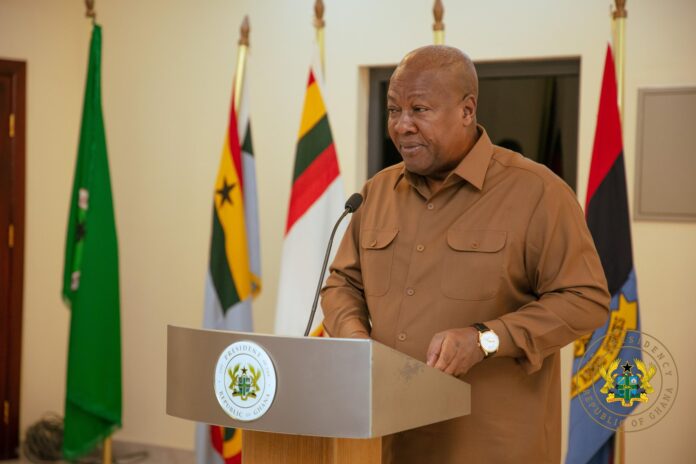The West Africa Director for CUTS International has urged President John Mahama and his cabinet to convene an emergency crisis meeting to strategize Ghana’s response to the newly imposed 10% tariff on Ghanaian exports to the United States.
Speaking on JoyNews’ PM Express Business Edition on Thursday, Appiah Kusi Adomako warned that the move by U.S. President Donald Trump could have “serious ramifications for Ghana’s economy,” especially as the future of the African Growth and Opportunity Act (AGOA) remains uncertain.
“I’m sure President Mahama and his cabinet should be having a crisis meeting to look at how we can respond,” he urged.
“Not in terms of putting tariffs on America, but in finding ways to protect our economy and exporters.”
Mr. Kusi Adomako explained that the tariffs would reduce Ghana’s competitiveness in the U.S. market, affecting businesses and jobs.
He recalled a visit to an AGOA-certified garment factory in Koforidua that exports clothing to major U.S. retailers like Walmart.
“That factory depends on duty-free access under AGOA, but if Trump’s tariffs stand, it could struggle to compete,” he warned. “And what happens to the hundreds of jobs there?”
He also raised concerns about AGOA’s renewal, which is up for review this year.
“AGOA was passed by the U.S. Congress, but whether the Trump administration will renew it, I doubt,” he stated.
“We may need to ask the U.S. Embassy for clarity, but this uncertainty alone is enough to make us rethink our dependence on big-brand America.”
According to Mr. Kusi Adomako, the tariff escalation should serve as a wake-up call for Ghana to diversify its markets and strengthen its participation in the African Continental Free Trade Area (AfCFTA).
“The Trump administration has shown that the U.S. can be unpredictable,” he said. “Even Canada and the UK were not spared. So how much more Ghana?”
He emphasized the need for Ghana to look inward, particularly towards regional trade.
“AfCFTA is here, and it’s a market with minimal restrictions on our products. If we can take advantage of that, we won’t always be at the mercy of external shocks.”
However, he highlighted poor trading infrastructure as a major obstacle to intra-African trade.
“If you want to ship goods from Ghana to Côte d’Ivoire, the ship has to go to Madrid in Spain before another ship brings it back to Côte d’Ivoire,” he lamented.
“Why? Because these logistics companies are owned by Europeans. We need to fix this.”
Mr. Kusi Adomako called for swift government intervention to shield Ghanaian businesses from the potential fallout of the tariffs.
“This is not the time for a wait-and-see approach. We need clear leadership. Mahama must act now.”
ALSO READ:

